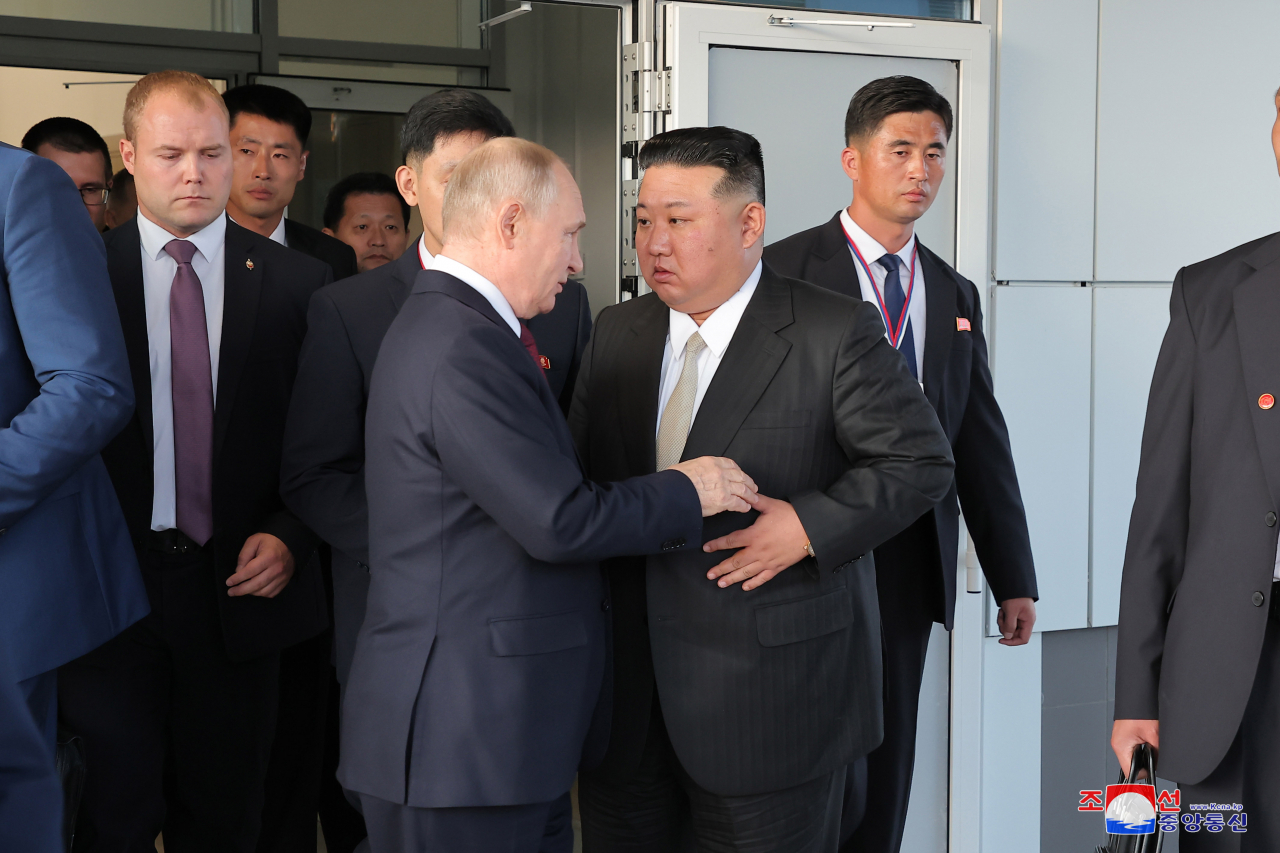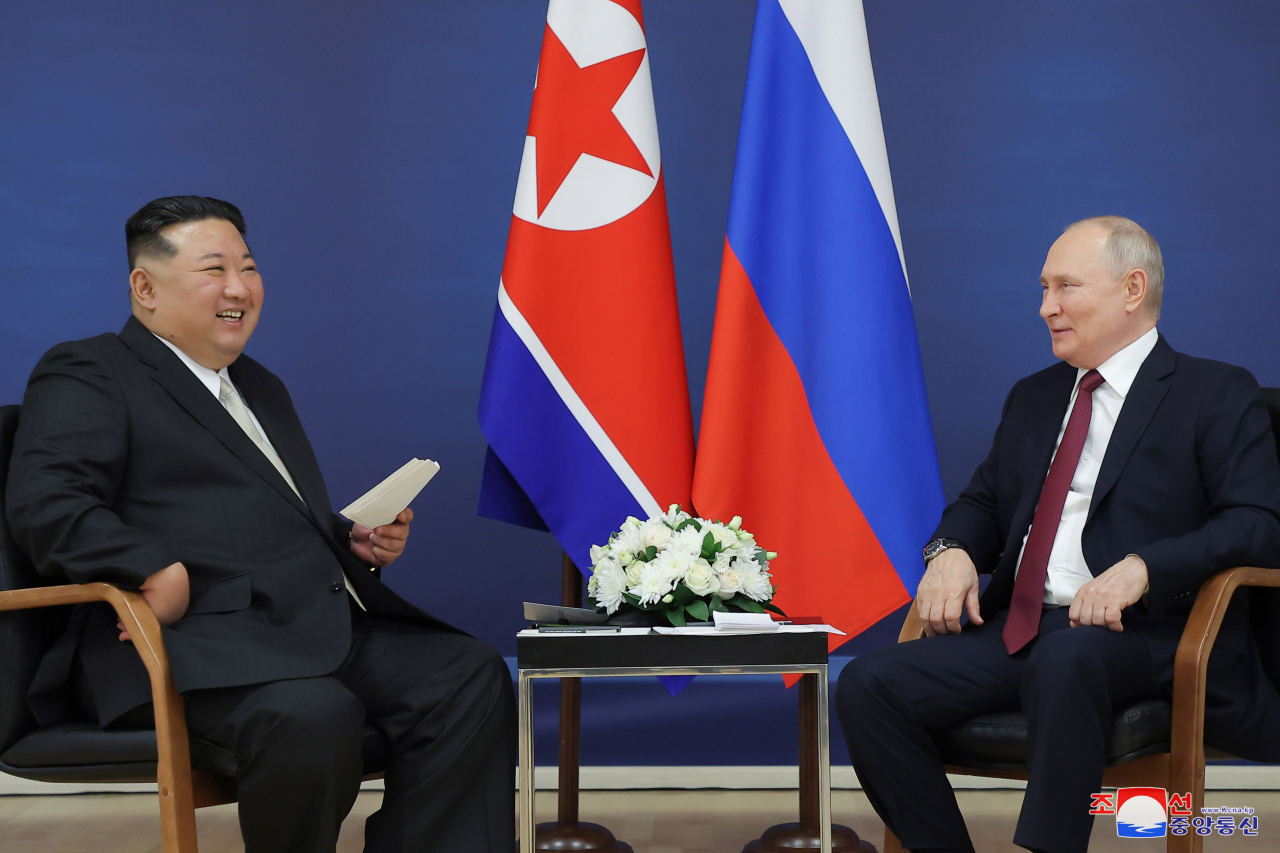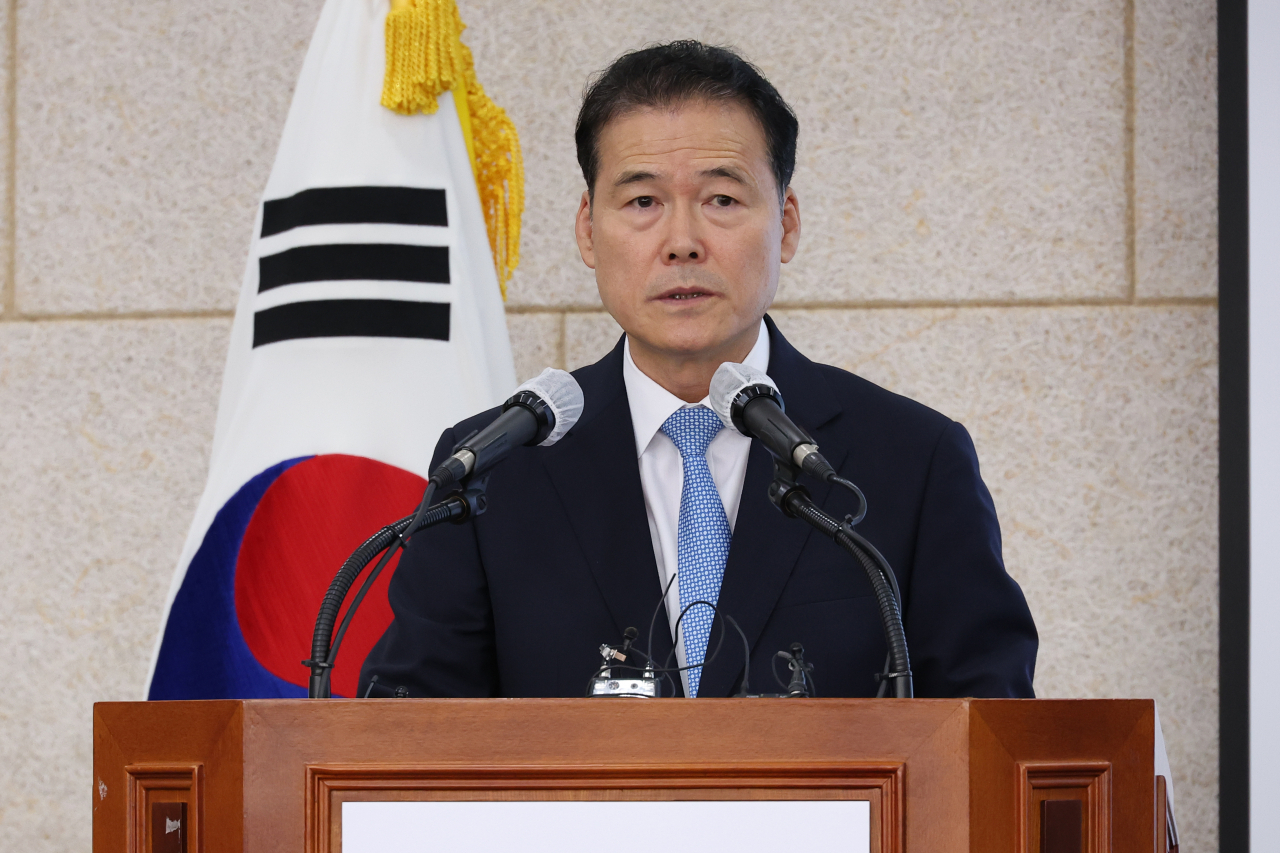Putin accepts Kim’s invite to N.Korea
NK leader heads to Khabarovsk reportedly to inspect fighter jet manufacturing; Seoul urges to end illegal military cooperation
By Ji Da-gyumPublished : Sept. 14, 2023 - 15:14

Russian President Vladimir Putin has accepted an invitation from North Korean leader Kim Jong-un to visit North Korea, following their high-stakes summit where they mutually committed to strengthening their alignment against perceived "imperialists’ military threats."
Kim extended the invitation to Putin after the reception of their summit at the Vostochny Cosmodrome in the Amur region of Russia's Far East on Wednesday, asking him to visit "at his convenience," North Korean state media reported Thursday.
"President Putin willingly accepted the invitation and expressed his commitment to invariably continue the history and tradition of the friendship between Russia and the DPRK," state media said, using the acronym for North Korea's official name, the Democratic People's Republic of Korea.
The announcement came hours after Kremlin spokesperson Dmitry Peskov said on Wednesday that there are currently no plans for Putin's return visit to Pyongyang. However, he added that Russian Foreign Minister Sergei Lavrov and his North Korean counterpart, Choe Son-hui, have been instructed by their respective leaders to meet in October to arrange Putin's trip.
North Korea and Russia have held a total of 15 official summit meetings, including the most recent one on Wednesday, since their initial summit meeting in 1949, according to South Korea's Unification Ministry. However, there has been only one instance of a Russian leader visiting North Korea, when then-Chairman Kim Jong-il met with Putin in Pyongyang in July 2000.

North Korean state media reported on Thursday that Kim and Putin discussed ways to strengthen friendship, solidarity and cooperative relations as well as boost mutual trust by deepening exchanges and cooperation across different fields, including high-level visits.
Both leaders also reached an agreement to further intensify "strategic and tactical cooperation to counteract imperialists' military threats, provocations, high-handed and arbitrary practices aimed at infringing upon the autonomy, progress and peaceful existence of humanity."
Following the summit, Kim was scheduled to visit the city of Komsomolsk-on-Amur in the Khabarovsk region, where he would tour factories producing aircraft and warplanes, according to Yonhap, quoting sources in Vladivostok. He would then travel to Vladivostok to see the Pacific Fleet’s capabilities, Putin said in an interview with broadcaster Russia 1 on Wednesday.
Kim's itinerary, and the military cadre delegation that accompanied him, show the major goal of the trip is to boost military ties with Russia.
South Korea's Unification Minister Kim Yung-ho on Thursday emphasized that the "military cooperation between North Korea and Russia has become conspicuous on the occasion of the summit" between Kim and Putin, expressing concerns over potential arms trade.
"There is a significant probability that military cooperation between the two countries will see further strengthening in comparison to previous times," Kim said during his first news conference since assuming office in late July, held at the Inter-Korean Relations Management Bureau building in Seoul.
"We once again urge Russia and North Korea to cease their unlawful and outrageous actions that have caused self-isolation and regression and to adhere to international norms, including United Nations Security Council resolutions."
Before the summit commenced, Putin said the venue of Russia's primary spaceport was deliberately chosen with the goal of assisting North Korea in satellite development. Putin noted that the North Korean leadership has expressed interest in rocket construction as they work on advancing their space technology capabilities.
After the summit, the Kremlin's Peskov announced that Russia is prepared to provide cosmonaut training to a North Korean candidate and potentially send them into space if Pyongyang expresses interest. He confirmed that this matter was discussed during the summit, according to Russia's state-run Tass agency.
But what matters is that there is little difference between a satellite launcher and an intercontinental ballistic missile (ICBM), as both share specific technologies that are either identical or can be interchanged.
The launch vehicles themselves are nearly identical, with the primary distinction between them being their payload. A space launch vehicle carries a satellite, whereas a missile carries a warhead. Therefore, the transfer of satellite technology has the potential to greatly enhance North Korea's capabilities in long-range ballistic missiles.

"North Korea exploits strategic competition between the United States and China, along with the confrontational dynamics between blocs, sparing no means or methods to bolster its nuclear and missile capabilities," Unification Minister Kim Yung-ho told reporters.
However, a high-ranking official at the Unification Ministry expressed skepticism about the long-term sustainability and endurance of cooperation between Russia and North Korea. The current alignment primarily arises from Russia's necessity to replenish depleted artillery ammunition, with the goal of gaining an advantage over Ukraine, the official said at the news conference.
The US has warned North Korea and Russia not to utilize the summit as a platform to advance negotiations on North Korea's transfer of weapons including artillery shells to support Russia's unprovoked, full-scale invasion of Ukraine.
"I question what Russia can realistically hope to gain beyond obtaining artillery ammunition in its relations with North Korea. From this perspective, Russia's provision of advanced military technology support to North Korea may indeed have its limitations," the official said on condition of anonymity.
"Russia may prioritize its relationship with South Korea as significantly more important than its relationship with North Korea from a long-term perspective."
While the summit has "posed a significant threat" to South Korea's national security, the official emphasized the need for South Korea to formulate measures in response to the deepening military alignment, "not solely from a short-term perspective but with a long-term outlook in mind."
"While some claimed that we should provide practical support to Ukraine in the form of lethal weapons with the North Korea-Russia summit happening, it's important to consider this matter with great caution when viewed from a long-term perspective," the official said.
The high-ranking official also downplayed the possibilities of China, North Korea and Russia forging a trilateral alignment akin to the security cooperation among South Korea, the US and Japan.
"Comparing the trilateral cooperation between South Korea, the United States and Japan to North Korea-China-Russia relations would be misleading," the official said.
"To put it simply, the level of cooperation among North Korea, China and Russia is considerably tenuous. China is also taking a step back."



















![[Today’s K-pop] Treasure to publish magazine for debut anniversary](http://res.heraldm.com/phpwas/restmb_idxmake.php?idx=642&simg=/content/image/2024/07/26/20240726050551_0.jpg&u=)